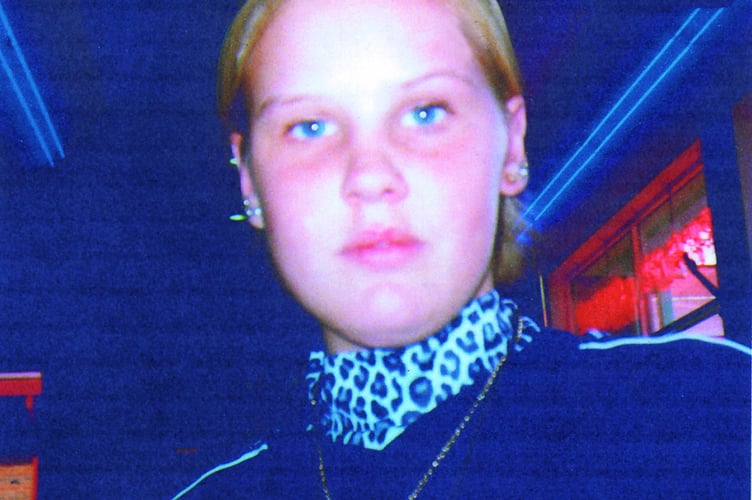A notorious double murderer is to have his application for parole heard next month.
Meanwhile, another life-serving killer has already been released from Jurby prison on parole.
Peter Newbery was jailed for life in 2004 for the murders of teenagers George Green and Samantha Barton. George Green’s mother Margaret said a victim liaison officer had been in contact to inform their family that Newbery’s application for parole would be heard in April.
She said: ‘It’s been a living nightmare. I get flashbacks all the time.
‘In 2002 our world fell apart when our youngest child and only son was murdered age 16 along with his friend the same age.
‘His murderer has now done his life sentence of 20 years.
‘We know he’s back in the island prison and we have been informed he is applying for parole.
‘I’m just hoping and praying that justice will prevail and they won’t let him out.
‘He has shown no remorse and never admitted he has done anything. He has still not co-operated in any shape or form.’
Samantha Barton and George Green, both 16 and in care, were stabbed and strangled with a pair of shoelaces at the Leece Lodge halfway house care home in Braddan in February 2002.
Newbery, 23, a jobless abattoir worker of Willaston Crescent, Willaston, also sexually assaulted both victims.

He left Samantha’s body at Leece Lodge, while George was found dumped in a field half a mile away.

At the time of the murders Newbery was on bail for a strikingly similar attack. The two murders sparked a long-running childcare inquiry.
When he was jailed for life, he was told he must serve 20 years behind bars before he could be considered for parole.
Newbery was transferred to Jurby jail from a UK prison in October 2020.
Meanwhile, a second life-serving prisoner who was transferred to the island’s jail that same month, has already been released.
Andrew Dickson, who was jailed for life in March 2001 after pleading guilty to the brutal murder of a father-of-two, secured parole at the end of January this year.
Keith Kirby was punched, kicked and then battered to death with a breeze block repeatedly dropped on his head in a lane off Mona Drive, Douglas, in January 2000.
He was lured to his death by painter and decorator Dickson, of Conister Road, Willaston, on the pretext of going for an after-hours drink after the two met in Studebakers nightclub.
The cold-blooded killer only confessed three weeks later after handing himself into police when video footage of him in the nightclub was released.
He had been watching the television news with his parents when his father recognised him in the video footage and told him to contact police to eliminate himself from the inquiry.
Dickson initially denied any involvement but then finally admitted he was the killer, telling police: ‘Everything came to a head and that was it – I just exploded.’
Sentencing him, Deemster Kerruish told him that he would have to serve a minimum of 15 years behind bars before parole could be considered.
The Department of Home Affairs said it could not comment on specific cases.
It pointed out that eligibility for parole does not mean automatic release and in the case of prisoners serving a life sentence, there is no automatic release.
A spokesman for the DHA said: ‘Before being released into our community any Manx prisoners who serve a life term must apply for parole.
‘This is a rigorous process where the parole committee considers a range of information from different sources to determine whether the offender’s risk to the public has reduced.
‘Under our legislation, even if released, all life prisoners will be subject to licence conditions for the rest of their lives. This means if they breach the conditions they may end up back in prison.
‘If the parole committee is satisfied that an offender’s risk to the public is appropriately reduced, they will direct the department to release the offender.’
She explained that in the event of a release, all serious violent and sexual offenders are subject to Manx public protection arrangements, which is a multi-disciplinary team including police, probation, health, mental health and social services and forensic psychologists.
This team considers how best to ensure the risk to the public is mitigated through a series of measures and monitoring. This would include the offender being fitted with a GPS tracking tag, said the DHA spokesman.
She said: ‘As part of the parole process, the victims’ families will be informed by the victim liaison officers on updates. It is entirely at the discretion of the victim if they wish to find out information.
‘The victim liaison officer will be able to pass on information about the process of release and parole, what is likely to happen and what the timescales are likely to be.
‘They may also discuss potential licence conditions, such as being prohibited from contacting individuals, or being excluded from specific areas.
‘This may include providing the victim or family with location information, so they can be aware of the places the offender may be – so that they can prepare for this, or avoid the locations.’
The spokesman added: ‘The reintroduction of any offender back into a community after a crime is difficult for victims and their families, and we are always conscious of the renewed impact that releases may have on their lives.
‘We have worked to ensure, as best we can, that the victims or their loved ones affected have been informed ahead of any releases, and our victim liaison officers will continue to support the families through this process.’
A third life-serving prisoner who was transferred from the UK to the island’s prison in October 2020 died last month after being released on compassionate parole, as last week’s Examiner reported.
Rapist Kevin Jewell died at Hospice Isle of Man shortly after his release.


.jpeg?width=209&height=140&crop=209:145,smart&quality=75)

.png?width=209&height=140&crop=209:145,smart&quality=75)